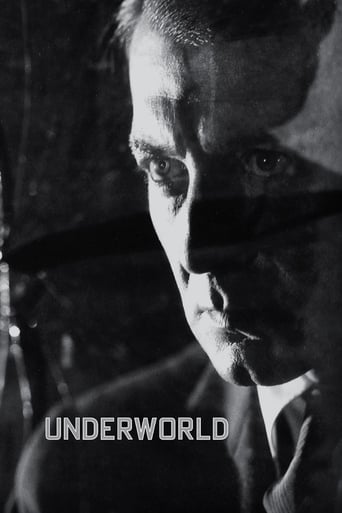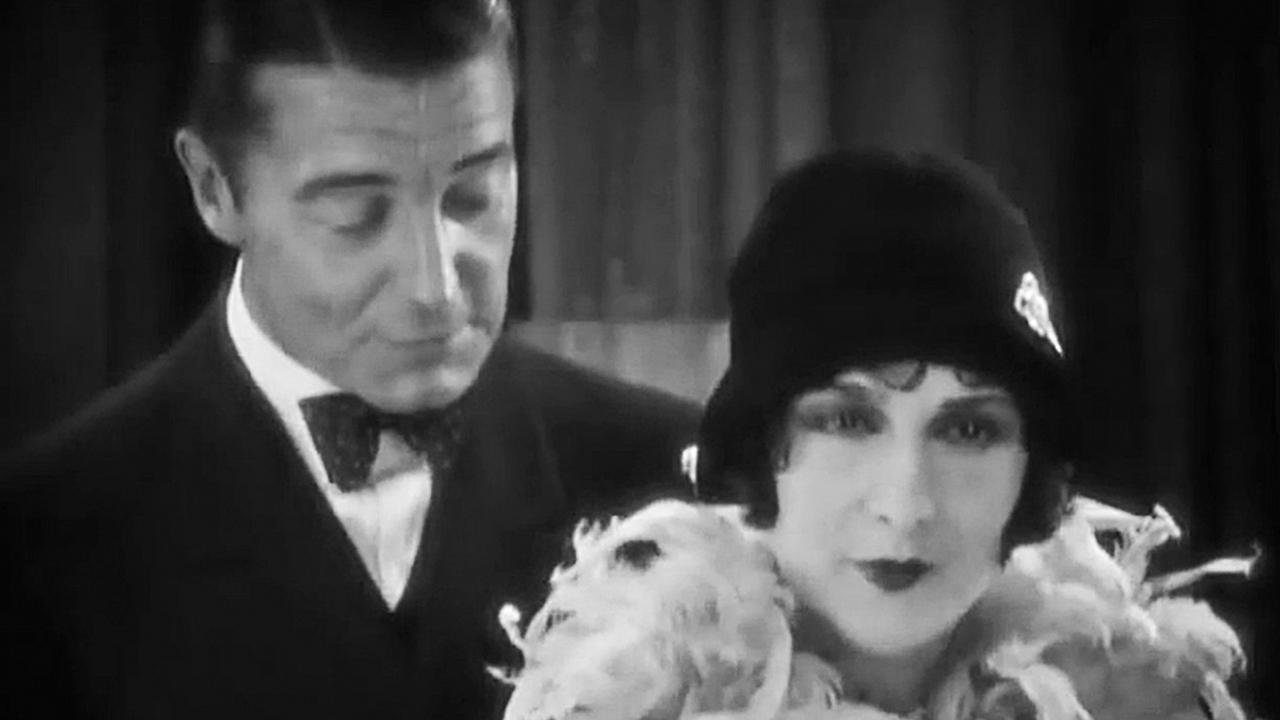silentmoviefan
This was a Christmas present to me several years ago. It has atmosphere out the wazoo! You feel like you're there in the midst of all those criminals and their dames! This film is so good, not even the presence of Larry Semon can mess it up! Bull Weed is a man's man and he does what he can right up to the time he's executed! He's also so noble, he goes back to prison to be put to death after taking care of some last-minute business. Evelyn Brent is as she always is, beautiful and a bit petulant. The only reason I don't give this a higher score is because gangster movies really aren't my thing that much. Plus, I like happy endings and executions (which you don't see because the film ends before the switch is thrown) just aren't my cup of tea. However, if you do like silent films and you do like gangster films, this one really is worth your while. Unlike certain other films, this one, I'm sure is available commercially somewhere.
chaos-rampant
I am not a big fan of the gangster film; when I am in the vicinity of the crime drama I always gravitate towards noir, where the moral lesson reserved for our protagonist in crime is not simply a present awareness that this life was only paid back with suffering but a deeper glimpse of the entire karmic process that produces a life of suffering.In a gangster film this lesson is expressed in one of two ways; the protagonist is either left a broken, doomed being whose tragic fate is envied by no one, or is purged in the fire and brimstone of a final violence. So although we have watched secretly fascinated at the social fabric in ruins, it is important, in both respects, that we leave the theater restored in ethical order. We thus assume the role of the despised public enemy; his fate is ours for having indulged the antisocial fantasy. The final taste is always gingerly bitter, and works when it does because we invested so much of ourselves in the wrong side of the fence.So you may hear of this as a milestone in the evolution of this type of film, and it's all because of the finale. It is this cathartic vision of some urban mid-station on the road to limbo where, amid a pall of gunsmoke and broken shards of brick wall, our protagonist comes to realize folly and is purged from life almost as a hero. It is important to note that he doesn't go out all guns blazing, but rather surrenders to the cops. He will face death, but will not be even momentarily martyred on screen; what is heroic about him, so properly old fashioned, is that he honorably extricates from his bloody fate the innocent.You can't miss any of this if you're a fan of the gangster genre. Scarface - the original - was built on this.There are a few other instances that exert some cinematic intrigue; the fast-cutting of faces, superimpositions, shadows across walls. But it does not match the more interesting experiments going on in silent cinema of the time, or what this man would be doing the following year.What is so apt about all of this is the smoky, drowsily anxious mood, the sense of excited weariness at the prospect of danger. There is a brawl in what only 30 years before would have been called a saloon. It's called the 'Dreamland Cafe', and just outside a neon sign reading 'The City is Yours' flashes the grinning mobster and his moll.
timmy_501
There's a card at the start of this that explains that Underworld popularized the gangster film and it's easy to see many of the conventions that would define this popular genre on display here. Von Sternberg's film emphasizes the romantic elements of the criminal lifestyle by minimizing the on screen violence (no innocent victims) and playing up the honor of the thieves with scenes such as the one in which all the city's criminals call a truce and attend a party in formal attire. There's also a love triangle between Bull Weed, the crime boss, his girl Feathers and the bookish alcoholic turned right hand man, Rolls Royce. The film is written by Ben Hecht, who recycled some of these ideas for Scarface a few years later; anyone who has seen that film will remember the sign that reads "The world is yours," which also appears here in slightly less dramatic form as well as scenes involving a gangster holing up in an apartment for a shootout with a huge number of police being common to both. Fortunately, Von Sternberg decided to interfere with Hecht's work, as all indications (especially this film's vast superiority to the later film) point towards his having greatly improved the script. While the story is pretty standard stuff, especially in light of all the familiar gangster films that would come later, Von Sternberg's direction is quite remarkable. The director's previous film The Salvation Hunters (1925) features some ambitious techniques but it also had pacing issues and an abrupt ending, neither of which mar Underworld. This plot unfolds at an admirably even pace, particularly in a scene in which a robbery committed by Bull is edited to intersect with a romantic dalliance between Rolls Royce and Feathers. Then there are the experimental/Impressionistic techniques Von Sternberg utilizes such as a shot from Rolls Royce's perspective, some superimpositions, and a quick montage at a party, all of which greatly complement the action without calling too much attention to themselves. Even at this early stage in his career, Von Sternberg was known for his sense of composition and mastery of visual techniques, both of which are in full effect here. This great film has recently become available on DVD from Criterion, with a really impressive transfer, a choice between two scores: one jaunty and upbeat and the other more somber, and a nice "visual essay" by UCLA professor Janet Bergstrom providing some historical context. Highly recommended.
secondtake
Underworld (1927)A lot of people avoid silent films at all costs, and I understand that totally. Many of these films are stiff, and the plots are either sentimental or obvious. But there are many reasons to watch a good, or great, silent film. Sometimes the acting, whatever its expressive style, is really wonderful. Often the photography and editing is really terrific and sophisticated. And the stories can be fast, fresh, and even pertinent.And finally, the silent films easiest for the uninitiated to approach are at the very end of the silent era. That would be 1927. See Joan Crawford in The Unknown for the bizarre, or Murnau's Sunrise for eloquence, or consider this film, the first major film by the soon to be legendary Josef von Sternberg. The only thing that might put off some people is the exaggerated expressions in one of the three main characters, Bull Weed. But go with that flow and you'll see not only some more subtle acting, but a sweet, violent, complex plot interweave in just an hour or so (81 minutes, though there is an 87 minute version out there if you can find it, Netflix doesn't have it). The Criterion disc version is really clean (another reason to consider this as an intro silent films, since it isn't broken up or scratched to death)."Underworld" is filmed with visual complexity even though it lacks some of the virtuosic moving camera of Murnau. The sets are simple but convincing, and the shift in attention to the gangster side of the story, complete with guns and molls and the precursors (or pre-precursors) of film noir, is gripping. It's not as intense as the heyday of gangster films just four or five years later, but it has if anything more emotional sophistication. The story was written by the legendary Ben Hecht, which might explain some of its success.Von Sternberg you say? Well, he was a master at creating aura, and between him and Dietrich a whole new level of starmaking savvy was born. This, as a first film, and as a last minute replacement, was expected to flop, and was released in a single New York theater. Word spread, however, and it became a hit. You can see why. Great stuff.


 AD
AD


